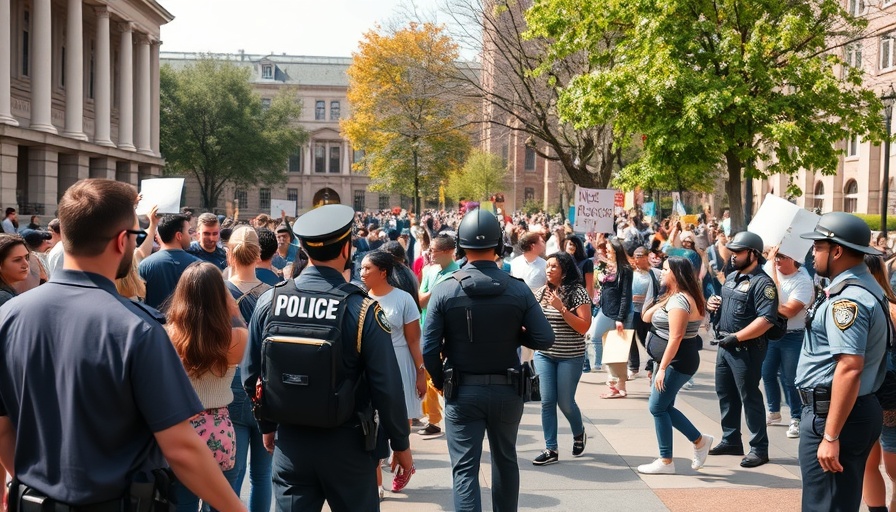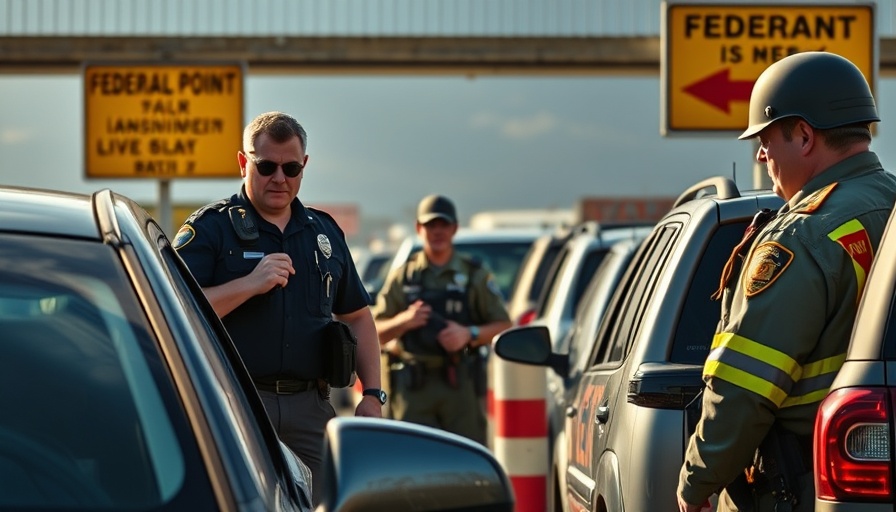
The Legacy of Student Protests on Campus
From the mid-1960s to the early 1970s, college campuses across the United States became hubs of activism. Students and faculty members rallied around causes such as the Vietnam War and socio-political injustices, demanding institutional changes. These protests laid the groundwork for today’s perceptions of free speech on campuses. Now, as history often has a way of repeating itself, we find ourselves amidst another transformative period where student voices clash with institutional power, raising pertinent questions about the role of policing in such environments.
Current Climate: A Tense Balance Between Safety and Free Speech
Today's college environment faces intense scrutiny, with lawmakers placing pressure on universities to take a harder stance against protests. Officials warn that failure to maintain order could result in funding cuts, creating a culture of fear among administrators. In response, many institutions have opted to increase their law enforcement presence, creating or expanding campus police units. This trend raises critical discussions about the balance between maintaining public safety and upholding the principles of free speech and civil liberties.
Policing Protests: Historical Contexts and Evolving Strategies
A look back at the response to protests in the past reveals a consistent pattern: heightened police presence and stricter regulations lead to escalations in violence and tensions. Universities today mirror this historical response, often opting to enforce codes of conduct that limit disruptive protests while inadvertently suppressing student expressions. Meanwhile, with the advent of social media, actions and events can be broadcasted widely, increasing accountability and the potential for public backlash against excessive police force.
Understanding the Dynamics of Police and Community Engagement
Law enforcement’s role in managing college protests raises questions about police-community trust, procedural justice, and accountability. Effective community policing strategies should involve collaboration between student groups and law enforcement, focusing on de-escalation techniques that minimize conflict. The implementation of crisis intervention strategies and the use of body camera footage can play vital roles in ensuring transparency and accountability during these situations.
The Future of Policing on Campus: Innovations and Reforms
As campuses evolve, innovative recruitment strategies for law enforcement personnel must be considered. Departments should prioritize hiring officers who are not only well-versed in law enforcement practices but also sensitive to community engagement and public safety innovation. Innovations in technology, such as public safety data analysis, can support the development of more effective policies tailored to the complex needs of college environments. Additionally, promoting officer wellness could improve interactions with students and foster an atmosphere of collaboration rather than conflict.
A Call for Policymakers to Reflect on Their Role
Policymakers need to take a hard look at their expectations for university administrators as they formulate policies around campus safety. If they place an undue emphasis on controlling protests rather than facilitating constructive dialogue between students and the administration, the risks of escalating tensions could lead to greater unrest. Implementing consent decrees and developing comprehensive use of force policies is essential in redefining the campus police’s role while simultaneously enforcing the necessary accountability measures to safeguard student rights.
Collectively, universities, law enforcement, and policymakers must navigate these evolving dynamics with an emphasis on understanding historical contexts while prioritizing public safety and civil liberties. By fostering open channels of communication, holding police accountable, and implementing innovative practices, we can create a more harmonious campus environment where every voice is heard and valued.
 Add Row
Add Row  Add
Add 

 Add Element
Add Element 


Write A Comment